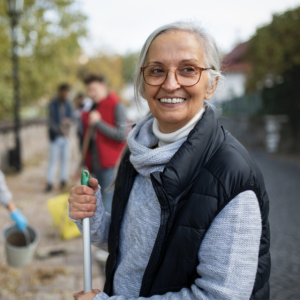Youthful Versus Useful: Find Your Purpose As You Get Older

Youthful Versus Useful: Find Your Purpose As You Get Older
February 7, 2024
This past August, the consultancy firm Age Wave, along with the Harris Poll, conducted a study entitled The New Age of Aging, which reports on the significant demographic shifts currently happening in our country and the changing views of Americans on getting older. This survey involved over 2000 respondents, 900 of whom were over the age of 50, and their responses reflected substantial shifts in the perceptions of Americans regarding aging and longevity. Among the important takeaways from this survey? Today’s adults believe it is more important to be useful than youthful. A staggering 83% of respondents 65 and older said feeling useful in their retirement years was more important than feeling young. In essence, the report reflected that older adults believe a sense of purpose and utility is critical to their later years. Another earlier report from Age Wave also confirmed the value of purposeful aging during the retirement years, calling it one of the four pillars of successful retirement (along with health, family, and finances).
What gives your life purpose? It may be different for each person but there’s a commonality to the effect: As one writer describes it, beyond giving you a reason to get up in the morning, “Purpose is so much more than being busy. It has to do with feeling needed and valuable. It involves continued exploration of your gifts and serving others with those gifts and talents. The aging process can cause an inward focus, spending all our time staying healthy and staving off illness and deterioration. In the meantime, our mental health suffers from a lack of direction and stimulation. Serving others is what gives life meaning.” It can also include an exploration that opens and exposes your mind in new ways, such as a new educational or occupational pursuit. Many find that a sense of purpose and service can be combined through valuable or unique volunteer opportunities. For some ideas about how to find those, take a look here and here.
But finding a purpose not only allows you to do good for others- it also supports your own health and well-being as you age. It’s thought that having a purpose is essential for healthy longevity and research studies have found an association between finding a purpose and better brain health. First, in a study published in Alzheimer’s Research and Therapy, researchers found a connection between purposeful living and the promotion of cognitive resilience in middle-aged adults. Creating and sustaining a sense of purpose could be one more way we can control our cognitive aging and lower our risk for dementia. Find out more here. Another study out of UC Davis determined that volunteering (one way of achieving purpose in life) is associated with better cognitive functioning in older adults. Examining the volunteer habits of a diverse group of older adults the researchers determined that those who volunteered had stronger scores on executive function and episodic memory tests and that the more a person volunteered, the higher their level of functioning. To find out more, grab that sign-up sheet and click here.







